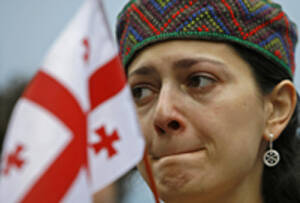The drama of Georgia continues to unfold. On Aug. 26, President Dmitri A. Medvedev of Russia announced that his country was recognizing the independence of the breakaway regions of South Ossetia and Abkhazia. Georgia’s President Mikheil Saakashvili, undeterred by his country’s defeat in a rapid, well-executed Russian intervention, has voiced his determination to rebuild his army and retake the secessionist regions. Meanwhile, the West is reduced to proclaiming its support for Georgian democracy and pleading for Russian withdrawal, something the Russians seem unready to do. The question for onlookers is whether the Georgian crisis will remain a melodrama in which ambition led the leader of a small country to test the will of his much larger neighbor or will become a tragedy engulfing the entire region in a new cold war between a resurgent Russia and a hobbled West.
Secession is always a messy and dangerous business. Nationalist hotheads seem to drive the drama. The First World War began with the assassination of the Archduke Franz Ferdinand in 1914 in Sarajevo by the Serbian nationalist Gavrilo Princip, resulting in the breakup of the Austro-Hungarian Empire into several new European states. The disintegration in the 1990s of one of those successor states, Yugoslavia, was spurred on by nationalists like Slobodan Milosevic, Franjo Tudjman and Radovan Karadzic. Kosovo’s eventual independence this year moved ahead after militants in the Kosovo Liberation Army shoved aside the long-time pacifist Kosovar leader, Ibrahim Rugova. Unlike Rugova, Georgia’s President Saakashvili seems disposed to be one of those hotheads who will drive a conflict well beyond the point where it is justified.
Secession is a difficult matter for political theorists; for once the division of a multinational state begins, it is difficult to anticipate where it will end. If the other major regions of the former Yugoslavia (Slovenia, Croatia, Bosnia, Macedonia and Montenegro) could break from Serbia, why shouldn’t the Kosovars? If the Georgians, Ukrainians, Azeris and Armenians could break from the former Soviet Union, why should not the Ossetians and Abkhazians have license to secede from a newly independent Georgia? In fact, their dissent from the government of Georgia in these regions dates back to the time of Georgian independence from the Soviet Union in 1991; and they have been able to thwart Georgian control and exercise a measure of autonomy ever since.
The Russians opposed the independence of Kosovo and the United States supported it; but now the United States upholds the authority of the Georgian government and, by implication, the forcible accession of the two breakaway regions to Georgia. U.S. policy, no less than Russia’s, has depended on its perceived interests and temporary advantage rather than on consistent principle.
Self-determination of peoples has been a principle of international affairs since the Treaty of Versailles in 1919. Its application, however, has frequently been a matter of contention and its theoretical foundations less than sure. Is a democratic majority by itself enough to establish a state? Do minority peoples have rights to self-determination by virtue of ethnicity or nationality, and must their rights supersede those of the majority? St. Thomas Aquinas warned against resort to armed conflict, even in situations of tyranny, if more harm would be done by the uprising than the government’s injustice had already inflicted. The inevitable recourse to force in secessionist movements is therefore under a burden to show honestly the injustices suffered and also to acknowledge fairly the rights of the majority.
Writing of wars of secession, the political philosopher Michael Walzer has argued that control of territory and “self-help”—that is, the capacity for self-rule, including self-defense—are primary conditions for the rightful exercise of self-determination. Yet the secessionists’ demonstration of these qualities is only one of the conditions that justify outside intervention; and the goal in these situations should not be to win, but only to secure the secessionists’ rights. According to Walzer, the values undergirding an intervention are protection of life and communal liberty. The invasion has now grown more problematic because of Russian control of Georgian resources and its occupation of other Georgian territory, like the port of Poti.
The application of the principle of self-determination is further compromised by the re-emergence of Russia as a powerful world actor and the threat of further aggression that the former Soviet states to its east and south have perceived in the intervention. While there may have been plausible reasons for Russia to intervene, any military move outside the secessionist territories, once a cease-fire has been concluded, would rightly be regarded as an act of aggression. Such aggression must be resisted, and the threat of its extension to other newly independent states must be thwarted.








